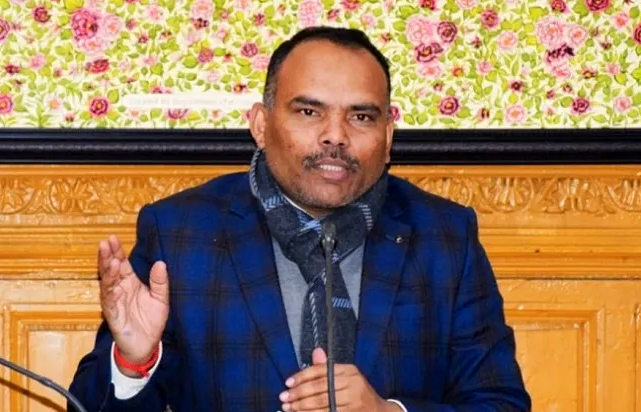Jammu, Apr 25: With the terror threat on the wane and changing dynamics in the Kashmir region, Jammu and Kashmir Chief Electoral Officer Pandurang K Pole is hopeful of a significant surge in voter participation during the Lok Sabha elections in the Valley.
The traditional narrative of poll boycotts orchestrated by separatist groups, prevalent for more than three decades, appears to be losing momentum and Pole expressed optimism regarding a manifold increase in voter turnout in the Valley.
Click Here To Follow Our WhatsApp Channel
Historically, factors such as the emergence of militancy in the early 1990s and threats of violence, including incidents such as the mutilation of inked fingers and stone-pelting near polling stations, deterred voters from exercising their franchise.
In an interview with PTI Video, Pole highlighted the current favourable environment created by the proactive engagement of political parties and candidates with the electorate, signalling a potential surge in voter participation.
“This time, the overall atmosphere is great and, the way the political parties and the candidates are reaching out to the people, a manifold increase in voter turnout is expected in the Valley,” Pole said.
Prime Minister Narendra Modi, during an election rally in Udhampur on April 12, credited the improved ground situation in the Valley to the revocation of Article 370 in August 2019.
He emphasised that the Lok Sabha polls in the Union Territory are anticipated to transpire without the shadow of terrorism, disruptions or cross-border tensions.
Significant shifts within separatist factions, notably the separatist amalgam Hurriyat Conference, have also contributed to the evolving political landscape.
Divisions in the conglomerate in 2003 and subsequent developments, including the passing of influential leaders such as Syed Ali Shah Geelani in 2021 and the incarceration of key figures on terror-related charges, have altered the region’s political landscape.
Despite historical trends of low voter turnout in Kashmir, 2014 showed promising signs with assembly polls in the then-state witnessing a record turnout of more than 65 per cent in the region.
Pole emphasised that the ongoing aggressive campaigning by political parties and the encouraging response from the public are likely to lead to improved voter participation.
He said the assembly polls, unlike the parliamentary elections, mostly used to have good voter turnout ranging between 50 and 60 per cent in Jammu and Kashmir.
“Voting in north Kashmir was relatively higher than south and central Kashmir, maybe because of local issues, presence of more candidates and active politics … What we are seeing today is that the political parties and the candidates are canvassing aggressively and the response of the people is also encouraging,” the chief electoral officer said.
With preparations in place to ensure security and build public confidence, Pole anticipates a notable improvement in polling percentages, particularly in north Kashmir where Omar Abdullah of the National Conference is contesting against separatist-turned-politician and former minister Sajjad Gani Lone of the People’s Conference.
The Anantnag-Rajouri seat goes to the polls on May 7, Srinagar on May 13 and Baramulla on May 20.
Udhampur-Kathua, which went to the polls in the first phase on April 19, recorded a turnout of 68.27 per cent. On Friday, polling will be held for the Jammu seat.
Pole also spoke about various initiatives under the Systematic Voters’ Education and Electoral Participation (SVEEP) Programme that have been launched to boost voter engagement, particularly in areas with historically low turnout, underscoring efforts to promote democratic participation and inclusivity in the electoral process.
Amid these developments, Jammu and Kashmir gears up for a potentially transformative electoral exercise, with hopes pinned on a vibrant and participatory democratic process shaping the region’s political future.


